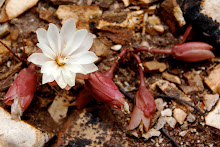Horsefeathers.
Last night I was watching this PBS special on hummingbirds and if you don't know already, they are absolutely my favorite animal of all time. Which is tough for a naturalist to say because, well, we like pretty much everything. Did you know that a hummingbird's heart can beat 1200 times per minute? PER MINUTE? And that hummingbirds can flap their wings more than 50 times per second? PER SECOND? They move their wings in a figure-8 pattern, which gifts them lift from both sides, allowing them to hover, fly backwards, and turn in a circle. At night, hummingbirds go into torpor, which means their bodies slow down - metabolism, heartrate, breathing - so they use very little energy. Even the bird's body temperature can drop to nearly match that of the ambient air temperature. Then, the next morning, the air warms and they wake up.
I know for South American tribes, hummingbirds are warriors. They will aggressively defend their territories and combat each other in the air. Here in North America, they were symbols of joy, rain, and emotional healing. They were perceived as miracles because of their incredibly tiny bodies and fast movement. The Rufous Hummingbird, the most aggressive on this side of the country, will even go after songbirds, squirrels, and buzz humans. They're so tough, they'll even kick females off their flowers!
I like to see hummingbirds as knowing what's important in life - they live for nectar, the sweetest juice on earth, and track the blooming of flowers like a cougar tracks a deer. They are incredibly fearless, and they are high energy, zooming about their business without even thinking of resting. Hummingbird-type people are doers, go-getters, and prioritize the important things in life, but they can burn out.
I don't know if this picture is real, but the sizing is right. This is the Bee Hummingbird, the world's smallest, found in Cuba.
One day last summer I went into the Nature Center to prepare for an Owl Prowl, where we lead groups of half-interested tourists around to look for nocturnal animals. Only minutes before people began to arrive, I was walking by an outlet with a cord coming out of it. Sitting on the cord was a tiny, motionless hummingbird. It had been trapped in the building for hours, which can mean certain death for these creatures as their metabolism necessitates constant feeding. I grabbed her up in my hands and she gave no fight - just toppled over and lay there. I was horrified and rushed her outside to the feeders full of sugar water. I dipped my finger repeatedly in the water and moved it across her mouth, prying the delicate beak apart. It took a while, but eventually she started flicking her tongue in and out - hummingbird tongues are CLEAR! She started to come around, slurping sugar water out of my hand, until she was able to sit up. She kept drinking, slowly, and then, all of a sudden - bzzzzz! Off she went, just like that. She sat in a nearby tree until I was forced to leave to run the program, but you can bet your ass I just wanted to sit there and watch her until it was too dark to see. It was such an incredible experience, and I'll never know if I saved her life, but having the chance to connect with a hummingbird like that was something I hope I never forget.
I've been designing a hummingbird tattoo for my right arm, kind of a mix of Egyptian, Art Nouveau, and tribal styles. I don't know if I'll ever get the guts to GET it, but a girl can dream I guess. Until then, I'll just goo over hummingbirds at every opportunity.
Gee, I guess I really like hummingbirds.
































